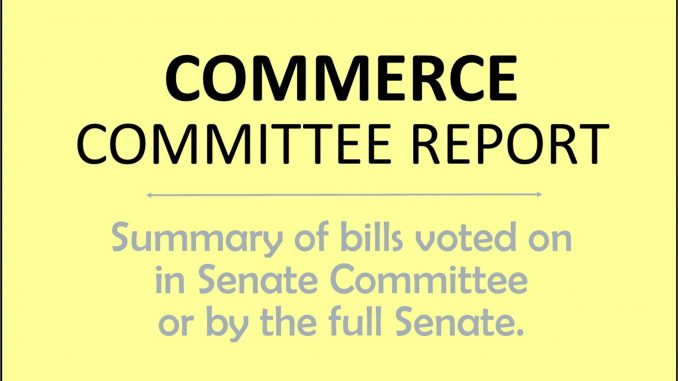
On this page
FLOOR ACTION:
SF 583 – Electric utility rates for private (solar) generation
SF 583, which passed the Senate last year, allowed investor-owned utilities to set minimum infrastructure charges for private net-metered customer generation. It exempted certain large renewable energy producers from the requirements regarding the utility infrastructure charges: (1) a cogeneration facility, including, without limitation, combined heat and power facilities; (2) a facility that produces renewable fuel registered with the U.S. Environmental Protection Agency as a manufacturer; (3) a facility that uses a de minimus amount of biomass in its operations (less than 10% of all fuel used in the generation processes); and (4) a private generation facility with a nameplate generating capacity greater than one megawatt. Opponents maintained that the proposal protected the largest renewable energy producers, and would in essence eliminate solar energy companies that work with consumers and small businesses.
This controversial bill passed the Senate March 18, 2019, on a non-partisan vote of 28-19. It was placed on the House Unfinished Business Calendar and was re-referred to the House Commerce Committee.
During the interim, stakeholders including MidAmerican Energy, Iowa’s solar industry, agricultural interests and environmentalists worked to craft a compromise. The result was a re-working of the entire proposal. This version passed the House on March 3 on a vote of 98-0. Lobbyists in support include the Iowa Environmental Council, Iowa Pork Producers, MidAmerican Energy, Iowa Solar Energy Trade Association, Center for Rural Affairs, Environmental Law and Policy Center, The Nature Conservancy, North Central States Regional Council of Carpenters, Iowa Association of Business and Industry, Greater Des Moines Partnership, Citizens for a Healthy Iowa and the Iowa Conference of United Methodist Church.
The amended bill codifies net metering, grandfathers in the current plans of existing solar customers, and provides a transition to a “Value of Solar” utility rate in the future.
The House “strike after” amendment:
- Creates new billing methods for distributed generation (solar) customers, including net metering billing or inflow-outflow billing. Solar customers would pay the retail rate for any kilowatt-hour (kWh) they import (inflow) while any kWh exported to the grid (outflow) is credited to the customer at an outflow rate.
- Codifies net metering as a single meter monitoring only the net amount of electricity delivered and exported to solar customers.
- Allows outflow credits to be credited monthly as dollar amounts to offset the customers’ monthly bill, which can be carried forward up to 12 months.
- Permits utilities to recover credited outflow amounts through an Energy Adjustment Clause or other rider mechanism.
- Initially sets the outflow rate at an applicable retail rate for each rate class.
- Creates a Value of Solar (VOS) study when distributed solar penetration reaches 5 percent of total peak demand, or by July 1, 2027, if the utilities petition the Iowa Utilities Board (IUB) to begin VOS process, whichever is sooner.
- Customers would receive a locked-in outflow rate for twenty years that is set: (1) equal to the retail rate prior to the VOS implementation; and (2) at the current VOS rate after VOS rate is determined.
- Allows any excess credits to revert to investor-owned utilities after twelve months to offset the rider mechanisms’ collections.
The Value of Solar (VOS) is created through a stakeholder process, overseen by the IUB, using an independent third-party consultant. The VOS rate must be unique to each utility based on the utility’s specific inputs. The tariff must be updated annually and the methodology must be updated every three years. The rate cannot fluctuate over 5% annually.
Both net metering credit and outflow rate must cover all volumetric charges, including rider charges on a kWh basis. Existing net metering customers are allowed to retain their current net metering rate for the duration of their current contract.
Investor-owned utilities are prohibited from: (1) using customer’s demand instead of energy use to limit system size; (2) charging solar customers additional fees; and (3) placing solar customers in a separate class until VOS or 2027.
[3/4: CONCUR 48-0 (Absent: Rozenboom, Wahls)]
HF 426 – IID background checks, fraud investigators
HF 426 is based on a non-controversial proposal recommended by the Iowa Insurance Division (IID) that clarifies the IID’s authority to review possible fraud cases in all areas regulated by the Insurance Commissioner. It also adds authorization of criminal history background checks for insurance producers and updates licensing requirements to meet the new standards. Almost all states require a criminal history background check (which includes fingerprints) for insurance producers. The IID worked with the Department of Public Safety’s Division of Criminal Investigation to ensure that the language would be acceptable to the FBI, which conducts the federal background checks. This will be applicable to new and out-of-state insurance producers, public adjusters and viatical settlement providers.
The
House passed HF 426 last year on a vote of 94-0. The Senate amended
the bill to include the additional language limiting two of the three
investigators to reviewing only workers compensation issues. The Division was
concerned that this stipulation is detrimental to its current fraud bureau
staff, which consists of a director, three investigators and a criminal
intelligence analyst. In 2018, 83 of the 1,046 investigation referrals were
related to workers compensation issues (about 9 percent), consistent with the
past three years of data. The bill as amended passed the Senate March 13, 2019
on a 32-17 party-line vote, Democrats voting no. The House took no further
action. This year, the House refused to concur and the Senate receded.
[3/4: RECEDE 48-0 (Absent:
Rozenboom, Wahls)]
